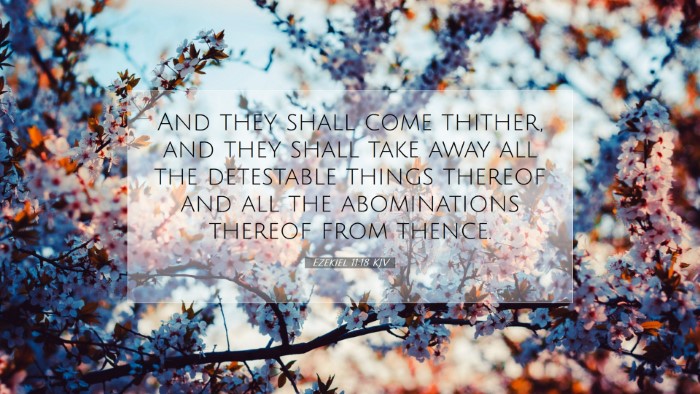Bible Commentary on Ezekiel 11:18
Verse: Ezekiel 11:18 - "And they shall come thither, and they shall take away all the detestable things thereof and all the abominations thereof from thence."
Introduction
The message of Ezekiel, particularly in chapter 11, addresses the degradation of Jerusalem and the necessity for spiritual and moral purification. The context of this verse highlights the promise of restoration to those who had been exiled. The exile was not merely a physical separation from the land but a profound spiritual crisis resulting from idolatry and disobedience to God. In this commentary, we will synthesize insights from prominent public domain commentaries to provide a rich understanding of this pivotal verse.
Contextual Analysis
The preceding verses discuss the condition of the people of Israel, who were beset with the consequences of their sins. Albert Barnes elucidates that this verse should be understood within the broader narrative of Israel’s moral and spiritual rehabilitation. The intention of God is to lead His people back to a place of holiness, emphasizing the transformative journey they must undergo.
The Concept of Coming Thither
Matthew Henry comments on the phrase "they shall come thither," indicating that God is calling His people back to a state of purity. This "coming" represents an awakening of the spirit and a readiness to forsake the former way of sin. It is not just a geographical return but a return to a covenant relationship with God.
Detestable Things and Abominations
The "detestable things" and "abominations" referenced in this verse pertain to idolatry and the corrupt practices that prevailed among the Israelites. Adam Clarke points out that these practices led to God's judgment and exile. The removal of these detestable things symbolizes the cleansing that must take place before restoration can occur. It is a clear call for repentance and purification, challenging the Israelites and believers today to reflect on their lives and the “abominations” that might exist therein.
- Idolatry: The worship of false gods had permeated Israelite culture. This was not only a personal sin but a communal one.
- Injustice: Practices that contradicted God's laws, including oppression of the poor and corrupt leadership, had to be addressed.
Theological Implications
From a theological perspective, Ezekiel 11:18 offers profound insights into the nature of God’s redemptive work. This call to cleanse the land speaks to God’s holiness and His desire for His people to be set apart for His purpose. Henry emphasizes that this passage serves as a robust reminder of the necessity for holiness in the life of believers. God's willingness to purge His people indicates His compassion and commitment to the covenant relationship.
Practical Applications
For pastors, theologians, and students of Scripture, this verse encourages self-examination and collective accountability within the church. The removal of detestable practices is not solely a historical reference but a contemporary challenge to confront sin in our lives and communities.
- Self-Examination: Believers are urged to reflect on personal sins and areas of compromise in their faith.
- Community Accountability: Churches must cultivate environments where congregants can address collective sins and work towards purity.
- Restoration and Hope: The promise embedded in this verse encourages faith in God’s ability to restore and redeem.
Conclusion
Ezekiel 11:18 serves as a powerful reminder of God's call for His people to return to holiness and hasten the removal of anything that could hinder their relationship with Him. It emphasizes that true restoration requires the active participation of the people in renouncing sin and diligently pursuing a life aligned with God’s will. By drawing insights from esteemed commentaries, we can better appreciate the spiritual depth of this verse and its application in our lives today.


